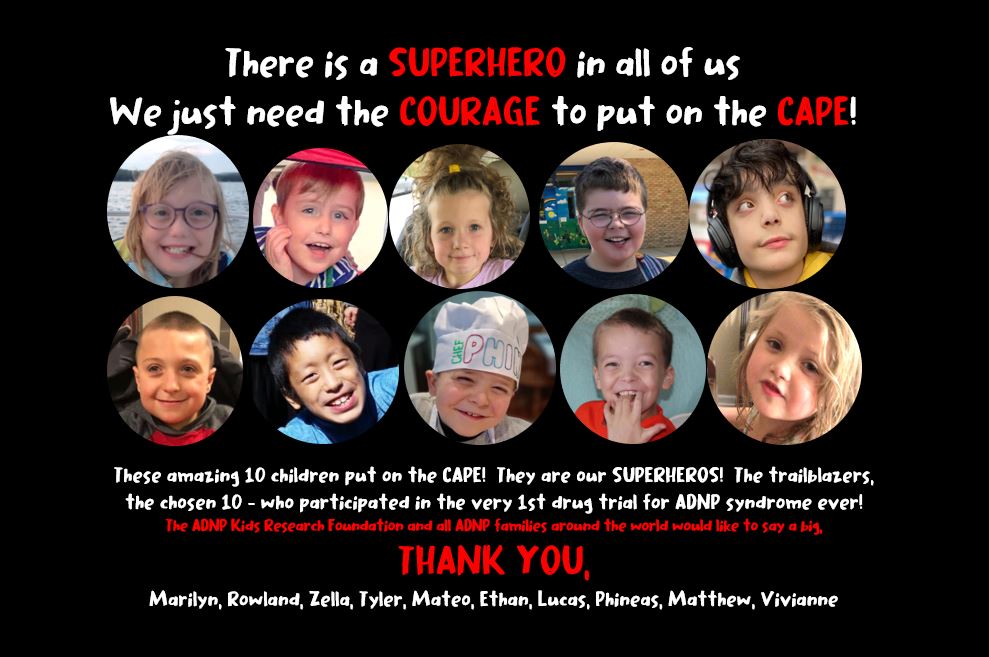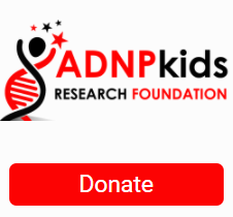Low-dose ketamine drug trial preliminary results are in, and they look very promising.
The Seaver Autism Center at the Icahn School of Medicine at Mount Sinai has released preliminary results from the clinical trial of low-dose ketamine, the first ever drug trial for ADNP syndrome.
ADNP Syndrome is an extremely rare neurodevelopmental and autism related genetic brain disorder caused by a mutation on the ADNP gene. ADNP is a crucial brain gene that affects brain development and brain function. It can affect many other organs and functions of body, potentially causing a multitude of problems with the neurological, cardiovascular, endocrine, immune, musculoskeletal and gastrointestinal systems, as well as vision, hearing, growth, feeding and sleep. Children have mild to profound delays in development, intelligence, speech and motor planning. ADNP is associated with epilepsy and is a top single gene “genetic cause” of autism spectrum disorder (ASD) and accounts for approximately 0.2% of all cases of ASD.
Sandra Sermone, President and CEO of the foundation says "the preliminary results for low-dose ketamine are looking very promising and certainly support the advancement to the next phase - a randomized controlled study, bringing us closer to what could be the first FDA approved drug for ADNP syndrome.”
The promise of ketamine may also extend to larger populations of individuals with autism who do not necessarily have ADNP syndrome, according to Ana Kostic, Ph.D., Director of Drug Discovery and Development at the Seaver Autism Center. "It could have beneficial effects in people who don't have the same mutation but who have similar deficits.“
Results and information from the principal investigator of the study, Alex Kolevzon, MD, Clinical Director of the Seaver Autism Center, are summarized below. In this summary, Dr. Kolevzon notes that “we are extremely encouraged by the early results but have more analyses to do to better understand the time course of change across the four-week study period, in addition to results from electrophysiological, eye tracking, and blood-based barrier biomarker studies.”
Summary of Results: (see full pdf version for complete information)
Dr. Kolevzon notes, “these results must be interpreted with caution given the small number of participants, absence of a placebo-control group, lack of correction for multiple statistical testing, and use of clinical outcome measures that have not been validated for ADNP syndrome. However, the findings from this initial pilot study clearly provide robust support for continuing the ketamine clinical development program in ADNP syndrome, and identify useful endpoints for such a program.”
"We are extremely thankful for Dr. Kolevzon and his entire team at the Seaver Autism Center and commend their efforts of pushing this trial forward as fast as possible to help our children. It's also important to note that this leap forward would not have been possible without two very important things; (1), the 10 families who allowed their ADNP child to participate in the drug trial, and (2), the ADNP community who supported the foundation to fully fund the first phase of the trial. We are extremely grateful because without them, this would not be possible." - Sermone
The Seaver Autism Center at the Icahn School of Medicine at Mount Sinai has released preliminary results from the clinical trial of low-dose ketamine, the first ever drug trial for ADNP syndrome.
ADNP Syndrome is an extremely rare neurodevelopmental and autism related genetic brain disorder caused by a mutation on the ADNP gene. ADNP is a crucial brain gene that affects brain development and brain function. It can affect many other organs and functions of body, potentially causing a multitude of problems with the neurological, cardiovascular, endocrine, immune, musculoskeletal and gastrointestinal systems, as well as vision, hearing, growth, feeding and sleep. Children have mild to profound delays in development, intelligence, speech and motor planning. ADNP is associated with epilepsy and is a top single gene “genetic cause” of autism spectrum disorder (ASD) and accounts for approximately 0.2% of all cases of ASD.
Sandra Sermone, President and CEO of the foundation says "the preliminary results for low-dose ketamine are looking very promising and certainly support the advancement to the next phase - a randomized controlled study, bringing us closer to what could be the first FDA approved drug for ADNP syndrome.”
The promise of ketamine may also extend to larger populations of individuals with autism who do not necessarily have ADNP syndrome, according to Ana Kostic, Ph.D., Director of Drug Discovery and Development at the Seaver Autism Center. "It could have beneficial effects in people who don't have the same mutation but who have similar deficits.“
Results and information from the principal investigator of the study, Alex Kolevzon, MD, Clinical Director of the Seaver Autism Center, are summarized below. In this summary, Dr. Kolevzon notes that “we are extremely encouraged by the early results but have more analyses to do to better understand the time course of change across the four-week study period, in addition to results from electrophysiological, eye tracking, and blood-based barrier biomarker studies.”
Summary of Results: (see full pdf version for complete information)
- Ketamine was generally well tolerated.
- Using parent-report instruments to assess treatment effects, ketamine was associated with nominally statistically significant improvement in a wide array of domains, including social behavior, attention deficit and hyperactivity, restricted and repetitive behaviors, and sensory sensitivities.
- Importantly, results derived from clinician-rated assessments aligned with findings from the parent reports.
- Overall global improvement was also evident based on the Clinical Global Impressions-Improvement scale, in addition to numerous clinician-based scales, all outlined on the full report.
- Preliminary data on ADNP expression suggest we are seeing approximately two-fold level increases in ADNP. However, the significance of this increase remains difficult to interpret and RNA sequencing studies are currently underway.
Dr. Kolevzon notes, “these results must be interpreted with caution given the small number of participants, absence of a placebo-control group, lack of correction for multiple statistical testing, and use of clinical outcome measures that have not been validated for ADNP syndrome. However, the findings from this initial pilot study clearly provide robust support for continuing the ketamine clinical development program in ADNP syndrome, and identify useful endpoints for such a program.”
"We are extremely thankful for Dr. Kolevzon and his entire team at the Seaver Autism Center and commend their efforts of pushing this trial forward as fast as possible to help our children. It's also important to note that this leap forward would not have been possible without two very important things; (1), the 10 families who allowed their ADNP child to participate in the drug trial, and (2), the ADNP community who supported the foundation to fully fund the first phase of the trial. We are extremely grateful because without them, this would not be possible." - Sermone
The potential of ketamine as a treatment modality for ADNP syndrome was identified in 2019 by *mediKanren, an artificial intelligence (AI) tool funded by NIH/NCATS, run by Matt Might, Ph.D. at UAB. Might is a fellow rare disease father and friend to Sandra Sermone who's son was the 1st child in the US diagnosed after the syndrome was discovered in 2014 . Sandra and Matt Davis, MD., who is also the father of a child diagnosed with ADNP syndrome and CSO of ADNP Kids Research Foundation, used the information and began their own analysis by scouring medical literature and processing the results. They found several animal model publications proving ketamine was able to boost ADNP production in brain cells. They spent months investigating and collecting the information and presented the evidence and their hypothesis to Joseph Buxbaum, Ph.D., Director of the Seaver Autism Center, who agreed this was a potential viable approach.
The trial was announced in November of 2019 at the first-ever ADNP Family Conference. FDA approval to move forward was obtained in early 2020, and enrollment began shortly thereafter in May of 2020. The first child was given the drug in September of 2020 and trial ended in June of 2020, 2 months ahead of schedule.
*MediKanren, developed by the Hugh Kaul Precision Medicine Institute at UAB, scours existing biomedical literature and many other databases assembled by the NIH/NCATS-funded Translator consortium looking for ways to treat diseases by reversing the impact of the root genetic cause.
PRIOR PRESS RELEASES:
Seaver Autism Center For Research and Treatment at Mount Sinai Launches First Drug Trial for ADNP SyndromeNew Clinical Trial Will Test Whether Ketamine Can Be Used to Treat Children with Autism
Seaver Autism Center For Research and Treatment at Mount Sinai Launches First Drug Trial for ADNP SyndromeNew Clinical Trial Will Test Whether Ketamine Can Be Used to Treat Children with Autism
| ketamine_in_adnp_letter_with_prelimininary_results.pdf | |
| File Size: | 172 kb |
| File Type: | |
Dr. Kolevzon can be reached at [email protected]
Inquiries to the foundation can be made by emailing [email protected]
Inquiries to the foundation can be made by emailing [email protected]


